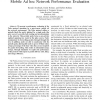Free Online Productivity Tools
i2Speak
i2Symbol
i2OCR
iTex2Img
iWeb2Print
iWeb2Shot
i2Type
iPdf2Split
iPdf2Merge
i2Bopomofo
i2Arabic
i2Style
i2Image
i2PDF
iLatex2Rtf
Sci2ools
108
click to vote
WONS
2005
IEEE
2005
IEEE
The Pulse Protocol: Mobile Ad hoc Network Performance Evaluation
— We present a performance evaluation of the Pulse protocol operating in a peer-to-peer mobile ad hoc network environment. The Pulse protocol utilizes a periodic flood (the pulse) initiated by a single node (the pulse source) to provide both routing and synchronization to the network. This periodic pulse forms a pro-actively updated spanning tree rooted at the pulse source. Nodes communicate by forwarding packets through through this tree. In addition, nodes are able to synchronize with the periodic pulse, allowing idle nodes to power off their radios a large percentage of the time when they are not required for packet forwarding. This results in substantial energy savings. Through simulation we explore the performance of the protocol with respect to packet delivery ratio, delay, and energy efficiency.
Related Content
| Added | 25 Jun 2010 |
| Updated | 25 Jun 2010 |
| Type | Conference |
| Year | 2005 |
| Where | WONS |
| Authors | Baruch Awerbuch, David Holmer, Herbert Rubens |
Comments (0)

